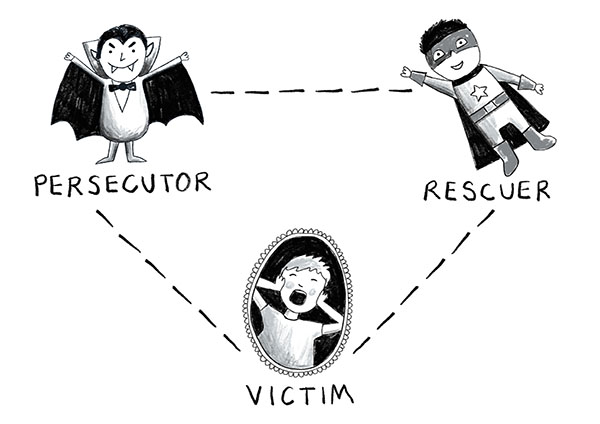Developed by Stephen Karpman, the Drama Triangle provides a social model of human interaction. Specifically, it describes the connection between personal responsibility and power in conflicts, revealing the shifting and often destructive roles people play. These roles form a ’triangle’ because people typically cycle between them, with each role triggering the others in a self-perpetuating pattern. These unhelpful behaviours occur in many situations, including supervisory relationships in the workplace. The three roles are the Victim, the Rescuer, and the Persecutor:
The Victim – the victim feels permanently oppressed, helpless, and powerless. This leaves them unable to make decisions, solve problems, or achieve any insight into the situation. Everything is the fault of external circumstances and other people.
The Rescuer – the rescuer loves nothing better than to swoop in and save the day like a superhero. Although they are trying to help, this behaviour actually keeps the Victim in a state of dependency. The Rescuer, meanwhile, can ignore their own needs by focusing entirely on “saving” somebody else. This can lead to an avoidance of their own problems, disguised as concern for the Victim.
The Persecutor – the persecutor is critical, controlling, and inflexible. They give feedback that keeps the Victim in a state of helplessness. This role might appear authoritative, but it arises from an unwillingness or inability to address underlying problems. They drain their Victim’s life force.

You can probably see how these roles might emerge in the supervisory relationship. If the student decides to be the Victim, it’s very easy for the supervisor to rise up as either the Rescuer or the Persecutor. Neither role is helpful! The supervisor can end up as the Victim, too. Insecure students might become Persecutors, making unreasonable demands and refusing to accept feedback. A supervisor might start out as a Rescuer, but become burned out and turn into a Persecutor.
If you find yourself in a supervisory relationship that isn’t working, consider what’s happening on the Drama Triangle. Have you or your supervisor adopted a specific role, forcing the other one into another unhelpful behaviour?
Common scenarios include:
Student as Victim – the student is overwhelmed by the challenge of pursuing a PhD and expects everyone else to help them. This results in a state of learned helplessness, where they don’t actually develop the necessary skills. The supervisor is required to spend considerable time and effort keeping them going, often to no avail.
Supervisor as Victim – the supervisor is overwhelmed by the challenge of supervising a student, either because it’s their first time, or due to a heavy workload. The student doesn’t get the support they need and falls behind.
Student as Rescuer – with a supervisor who is a victim, the student sometimes tries to save the day by overlooking missed appointments or trying not to take up too much time. They then don’t receive adequate support.
Supervisor as Rescuer – with a student in a state of victimhood, the supervisor repeatedly solves their problems, making them feel better and avoiding the underlying issues.
Student as Persecutor – the student, perhaps aware of their own limitations, blames the supervisor and makes them responsible for everything. All solutions are external, requiring more time and resources. Whatever is provided is never enough.
Supervisor as Persecutor – lacking the skills or the time to achieve a lasting solution, the supervisor becomes more demanding in the hope that the application of pressure improves performance.
Can you spot any familiar patterns here? It’s easy to fall into these roles, in any areas of our life or work. When the supervisor becomes a Persecutor, the automatic response is to become a Victim. This serves only to perpetuate the roles. Of course, you can’t tell your supervisor they’re a vampire who’s draining your life-force. What you need instead is to achieve a Win-Win. Healthy supervisory relationships involve clear boundaries, shared responsibility, and direct communication.
This content is adapted from my book How to Finish Your PhD. I also run a workshop on Working with Your PhD Supervisor.